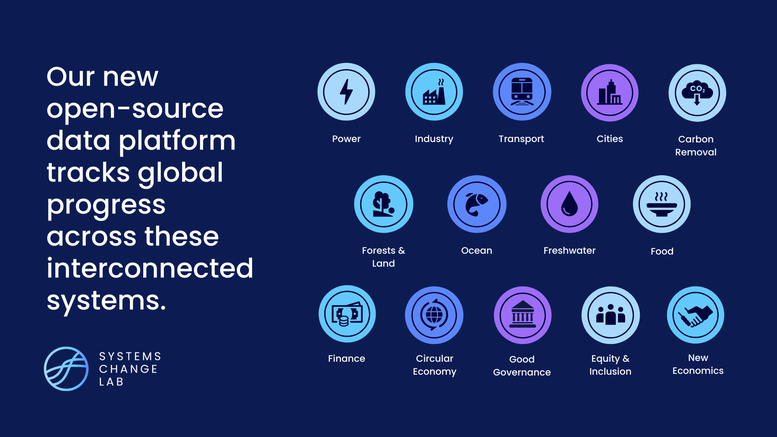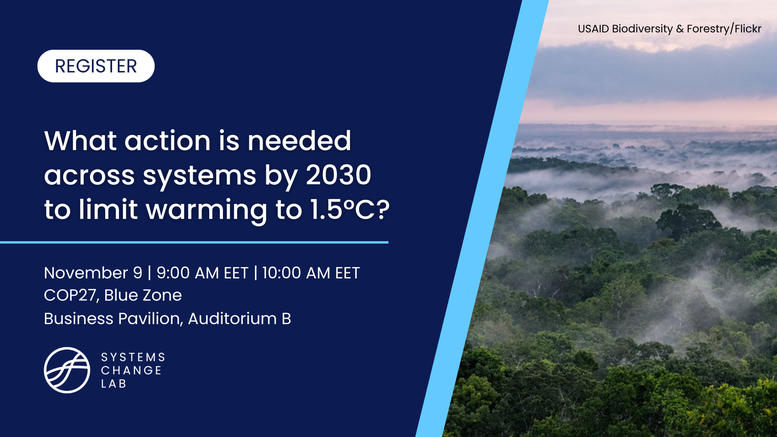Systems Change Lab data platform launch
Overview
In a collaborative effort the Systems Change Lab, of which CAT is a partner, has launched a new open-source data platform: systemschangelab.org! It tracks global progress across nearly every major system, including how we power industries, build cities, govern societies and conserve nature.
Systems Change Lab has identified more than 70 transformational shifts needed to protect both people and the planet, highlighting current action against climate, biodiversity and equity targets.The interactive data platform identifies which shifts are accelerating or heading in the wrong direction, as well as the key forces driving these changes.

Highlights
The platform initially draws on the information and methodology underpinning Systems Change Lab’s State of Climate Action 2022 report — expanding beyond climate action by highlighting current action toward climate, biodiversity and equity targets.
The platform identifies dozens of transformational shifts that are necessary to protect both people and the planet, and highlights progress that is needed to reach future targets. Systems Change Lab classifies which changes are accelerating or moving in the wrong direction altogether, calculating the necessary factors of acceleration to meet these key targets.
- While the number of people without access to electricity dropped steadily over the past two decades — reaching 733 million in 2020 — efforts will need to accelerate by 1.6x to achieve universal access by 2030.
- The share of electric vehicles in passenger car sales is already increasing exponentially, up to almost 9% in 2021, but this change will need to accelerate by a factor of five to reach the 2030 target of 30%.
- Public climate finance will need to expand four to nine times to reach between $1.31 and 2.61 trillion per year by 2030. Such an increase will require growing at an average rate of $166 billion per year between 2020 and 2030.
- Global green hydrogen production increased almost sevenfold between 2010 and 2020. Current annual green hydrogen production globally is only 0.03% of what is required in 2030 to achieve the target.
In addition to tracking progress toward future targets, the platform monitors both enablers and barriers of change. These include investments, policies, leadership from governments and companies, among other factors that can drive progress or inhibit change. Looking to these enablers and barriers, we find signals of change and opportunities for growth. For example:
- Global investments in battery storage have grown from $1.6 billion in 2015 to $18 billion in 2022, reaching an average growth rate of 36% per year since 2019.
- Between 2010 and 2020, global green hydrogen production increased almost 7-fold.
- The total number of announced low carbon steel projects has been increasing rapidly in recent years — there were nine in 2019 and 51 in 2021.
- In 2015, around twice as much power system investment was made in renewables than in fossil fuels. Since then, renewable investments have been increasing sharply — as of 2022, around four times as much investment is being made in renewables than in fossil fuels.
- About 23% of global greenhouse gas emissions were covered by a direct carbon pricing regime as of 2022, compared with 13% in 2020.
What's next?
Additional content and features will be released in 2023, including an interactive “Connections Dashboard” that shows how systems are related. The final platform will feature more than a dozen systems: Power, Industry, Transport, Cities and the Built Environment, Technological Carbon Removal, Forests and Land Management, Ocean Management, Freshwater Management, Food, Finance, Circular Economy, Good Governance, Social Inclusion and Equity, and New Economics for Climate and Nature.
Systems Change Lab Partners
Systems Change Lab is a collaborative initiative of many organisations: Convened by World Resources Institute and Bezos Earth Fund, Systems Change Lab supports the UN Climate Change High-Level Champions and works with key partners and funders including Climate Action Tracker, ClimateWorks Foundation, Global Environment Facility, Just Climate, Mission Possible Partnership, Systemiq, University of Exeter and the University of Tokyo’s Center for Global Commons, among others.
SCL at COP27
Stay informed
Subscribe to our newsletter
